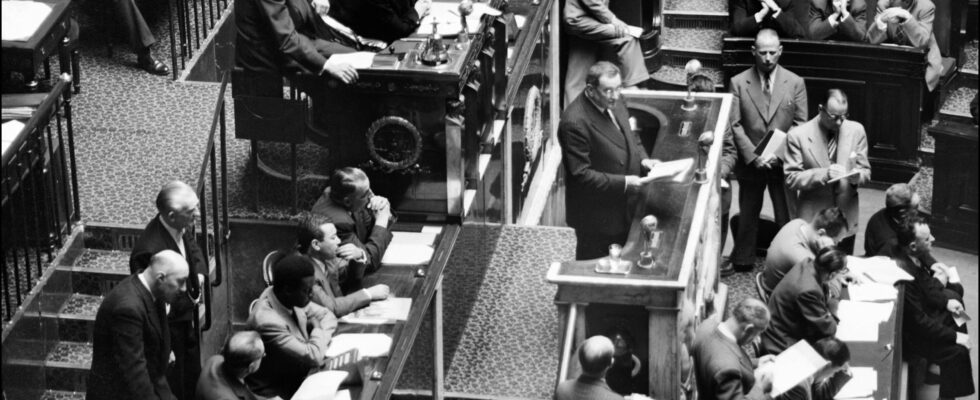On July 7, the French were sent back to 1945, when three blocs shared the benches of the Assembly: the Communist Party, the Popular Republican Movement (MRP), Christian Democrat, and the SFIO. The left was in the majority, but the socialists feared a face-off with a Maurice Thorez under orders from Moscow. So, they campaigned for a ménage à trois in order to implement the social program of the National Council of the Resistance (intensification of production, comprehensive social security plan, retirement for all, etc.). The fact that the reins of the harness were held by the head of the provisional government of the Republic, de Gaulle, crowned with his status as leader of “Free France”, was reassuring.
The code of good conduct that was supposed to govern their relations did not withstand their disagreements on Indochina, economic policy and the nature of the future Fourth Republic. On January 20, 1946, General de Gaulle decided to “fuck off”. The “tripartism” would last for a year, until the President of the Council, the socialist Paul Ramadier, dismissed the communists who had refused to trust. A new coalition, the Third Force, in which radicals and moderates replaced the communists, would govern for four years, under the supervision of the two “anti-system” parties, the PCF and the Rally for France (RPF), loyal to the “General”.
After the event, the Gaullists had a good game in weaving the black legend of these 21 successive governments, of this “party regime” which had shattered over the “Algerian question”. But who understood the stakes when it took de Gaulle, despite being endowed with exceptional powers, four years of blood and tears to resolve it? However, Pierre Mendès France made peace in Indochina (1954) and set Morocco and Tunisia on the path to independence. From 1956, black Africa was governed by the Defferre framework law, which gradually transferred the powers of the metropolis to the “associated” territories. The regime must have been a “seller of empire”, because it was aware of the irrevocable emergence of national sentiment in these distant lands and the impossibility of the status quo. On the other hand, he cannot be accused of having been subjected to the “dictat” of the parties, whose weakness of the governing bodies and the indiscipline of the elected representatives have, on the contrary, fuelled ministerial instability.
In hindsight, the record of this mocked Republic seems generally positive. Constrained by the Cold War, the regime contributed to the emergence of European institutions with a military or economic vocation, with the European Coal and Steel Community (ECSC) as its high point. Certainly, the failure of the European Defence Community (EDC), whose principle clashed with the fear of “German rearmament”, shook the political class. But the latter knew how to make the best of a bad situation by choosing another path: that of the Common Market, opened by the Treaty of Rome (1957).
Nothing prevents reforms from being carried out
The spur of growth during the Trente Glorieuses made people forget the shortages and ministerial instability. From 1950 to 1958, national income, purchasing power, industrial production, exports and consumption increased by 40%. The elected officials had kept the moral standards of the Resistance, from which two-thirds of them came. A new technocracy and a union elite invested themselves in the consolidation of the welfare state and the success of the Plan, intended to lift the country out of archaism. Even the severe Raymond Aron was grateful to the Fourth Republic for having taken “the right major decisions” in diplomacy and in the economic domain for having “exceeded the most optimistic hopes”.
As in the past, France could experience a succession of left-wing, right-wing, or “concentration” governments, a term used under the Third Republic to designate the union of moderates. Some teams could only make a brief passage, depending on the motions of censure. However, nothing prevents reforms from being carried out, if a compromise with other forces is reached. Finally, the current Constitution allows for governing by decree in many areas. And if the law is imposed, for the budget for example, it can be adopted without a vote, thanks to the famous article 49.3, which those who have never stopped denouncing its use will be happy to be able to use.
.
